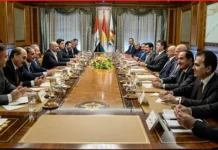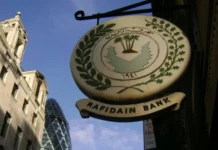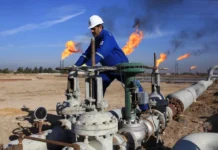140 Trillion Dinars Enter The Iraqi Treasury In One Year, 91% Of Which Comes From Oil.
Energy and Business breaking 2025-06-06 23:32 Shafaq News/ The Iraqi Ministry of Finance revealed on Saturday that the revenues in the 2024 federal budget exceeded 140 trillion dinars, confirming that oil contributed 91% of those revenues.
Shafaq News Agency reviewed the data and tables issued by the Ministry of Finance in May for the previous fiscal year’s accounts, which showed that oil remains the primary source of revenue for Iraq‘s general budget, accounting for 91% of the total.
This indicates that the rentier economy remains the foundation of the budget structure.
The tables indicate that
total revenues in 2024 amounted to 140 trillion, 774 billion, 106 million, 157 thousand, and 464 dinars, while
total expenditures amounted to 125 trillion, 214 billion, 440 million, 53 thousand, and 991 dinars.
According to the tables,
oil revenues amounted to 127 trillion, 536 billion, 400 million, and 812 thousand dinars,
representing 91% of the general budget, while
non-oil revenues amounted to 13 trillion, 237 billion, 705 million, and 728 thousand dinars.
In this regard, economic expert Mohammed al-Hasani told Shafaq News Agency,
“Iraq‘s reliance on oil for its public revenues indicates that
the country is still suffering under the burden of a rentier economy, disguised unemployment, and other economic problems
that constitute an obstacle to any progress.”
He added, “Iraq needs major economic reforms focused on
diversifying the economy,
improving spending efficiency, and
combating financial waste
to ensure a sustainable economic future.”
In March 2021, the Prime Minister’s financial advisor, Mazhar Mohammed Salih, told Shafaq News Agency that the
reasons for the economy remaining rentier are due to the
wars and
economic blockade imposed over the past decades, as well as the
political conflicts Iraq is currently witnessing, which have led to the dispersion of economic resources.
The Iraqi state’s continued reliance on oil as the sole source of its public budget
exposes the country to the risk of global crises linked to oil markets.
This forces it to cover its deficit through external or domestic borrowing each time.
This indicates a
weakness in the management of public funds and an
inability to find alternative financing solutions.
https://shafaq.com/ar/اقتصـاد/140-تريليون-دينار-تدخل-خزينة-العراق-في-عام-91-منها-من-النفط
Iraq Moves Towards Its “Forgotten Treasure”
Posted on2025-06-07 by sotaliraq On Friday, the Parliamentary Foreign Relations Committee called on the Iraqi Ministry of Foreign Affairs to demand that ambassadors and chargés d’affaires at embassies and consulates abroad take serious action to inventory Iraqi property and officially return it to state ownership.
$90 billion in the shadows… Iraq searches for a map of its forgotten treasure.
Committee member Mukhtar al-Moussawi said, “Iraq has numerous assets and real estate properties in various countries around the world, and all their original and documentary evidence is available.
However, it requires intensive efforts to inventory them and take the necessary measures to recover them from those entrusted with them or those in whose names they were registered during the former regime.”
Al-Moussawi called on the Iraqi Ministry of Foreign Affairs to “demand that Iraqi consuls and ambassadors take the necessary action and make genuine efforts to recover these numerous Iraqi assets, valued at millions of dollars, including a large mosque in Australia, large tea plantations in Sri Lanka, and farms in Yemen.”
Regarding the lifting of the seizure of some properties belonging to the former regime within the Green Zone, Al-Moussawi confirmed that “some properties will be sold to their occupants at a price estimated at four million Iraqi dinars per square meter, a price that is not commensurate with the importance and location of these properties.”
Shafaq News Agency revealed in an investigation, citing senior diplomatic sources, that Iraq has at least 50 real estate and investment projects spread across Europe, Asia, and Africa, including luxurious palaces, farms, banks, commercial offices, and strategic factories.
These assets were part of Iraq’s expansionist economic policy during the 1970s and 1980s, when it used oil revenues to purchase strategic assets around the world to bolster its economic and diplomatic standing.
However, after the fall of the regime in 2003, this issue entered a cycle of neglect and loss. The Parliamentary Integrity Committee revealed that essential property documents had been stolen or destroyed, that some properties had been transferred to individuals or front companies affiliated with the former regime or networks linked to it, while others remained without any significant follow-up.
Initial estimates put the value of these assets at between $80 and $90 billion. Economists believe that recovering even a small portion of them or investing them properly could generate sustainable revenues for a country whose budgets depend almost exclusively on crude oil exports.
However, according to legal experts, some of these assets may have been subject to statutes of limitations in host countries, or were subject to legal actions that legalized ownership by third parties after Iraq’s absence from the scene for two decades.
In addition, there is a fear that internal political interference could hinder recovery efforts, especially if current properties are tied to powerful interests or old contracts that are difficult to cancel without engaging in complex legal disputes. LINK
Where Did It Go? .. Iraq’s Internal Public Debt Is Rising.
Posted on2025-06-07 by sotaliraq June 7, 2025 The Central Bank of Iraq announced today, Saturday, that Iraq’s domestic public debt rose at the end of March of this year, revealing the entities to which the debts were allocated.
The bank stated in an official statistic that Iraq’s domestic debt rose to 85.536 trillion dinars at the end of March 2025, compared to 82.608 trillion dinars in February.
She added that this debt also increased by 2.91% compared to the end of 2024, which amounted to 83 trillion and 50 billion dinars, and increased by 17.53% compared to the end of 2023, which amounted to 70 trillion and 585 billion dinars.
The bank explained in its statistics that these debts, amounting to 85.536 billion dinars, come in the form of bonds amounting to 12,567,939 trillion dinars, in the form of government bank loans amounting to 5,800,000 trillion dinars, and in the form of loans to financial institutions amounting to 13,352,406 trillion dinars.
He added that the debt also comes from treasury transfers for the Ministry of Finance amounting to 2,030,000 trillion dinars, treasury transfers amounting to 51,030,130 trillion dinars, and debts on the Ministry of Finance amounting to 755 billion and 519 million dinars. LINK
Basra Crude Records Weekly Gains Of 2.42%
economy | 07/06/2025 Mawazine News – Baghdad – Basra Heavy and Medium crude oils posted weekly gains, as global oil prices rose.
Basra Heavy closed the last session on Friday, up 40 cents, reaching $61.83 a barrel, recording weekly gains of $1.46, or 2.42%.
Basra Medium crude also closed the same session, up 40 cents, reaching $64.68 a barrel, achieving weekly gains of $1.15, or 1.81%.
Globally, Brent and Texas Intermediate crudes posted weekly gains at the settlement after two consecutive weeks of decline. Brent crude rose 2.75% since the beginning of the week, while West Texas Intermediate crude increased by 4.9%. https://www.mawazin.net/Details.aspx?jimare=262248
For current and reliable Iraqi news please visit: https://www.bondladyscorner.com/






